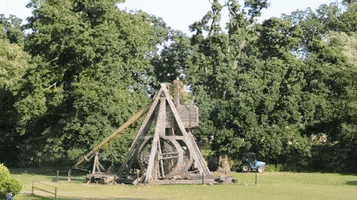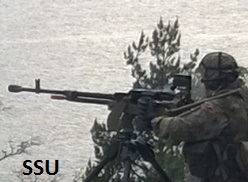The big guns were totally ineffective in World War Two as well, the enemy doesn't have to dig that deep, to completely neutralize the effects of the big guns, it's just a version of the Somme at sea, when you hit the beach, they simply come up out of their dugouts and mow you down in a withering hail of fire, Normandy to Iwo Jima, the big guns didn't do a lick of good, if anything, they simply cost you the element of surprise, by alerting the enemy that the landings are imminent.
For an opposed landing, you want to come ashore as fast as possible with the least amount of time for the enemy to get set, and with amphibious tanks that work, otherwise, it's going to be a meatgrinder, and the big guns will have nothing to say about it, the Germans and Japanese simply rode all that noise out, in their bunkers, and smashing the place up without killing them, actually favours the defender, if you bombard the beachhead into a morass, just makes it that much harder to get out of the kill zone and inland quickly.
Quite frankly, all "preparatory bombarments" were and are counterproductive nonsense.
[Documentary] WWI - Battle of Jutland
-
Smitty-48
- Posts: 36399
- Joined: Wed Nov 30, 2016 3:22 am
Re: [Documentary] WWI - Battle of Jutland
Last edited by Smitty-48 on Tue Jan 10, 2017 2:57 pm, edited 1 time in total.
Nec Aspera Terrent
-
Montegriffo

- Posts: 18852
- Joined: Wed Nov 30, 2016 7:14 am
Re: [Documentary] WWI - Battle of Jutland
Is there ever such a thing as surprise when it comes to beach assaults? No real way to hide warships approaching the coast.
I am unsure as to why you think artillery from ships is less effective than land based guns. Is it because the ships had to stay out of range of shore batteries so could not be accurate enough to be effective?
edit. I see you answered some of this in your edit.
I am unsure as to why you think artillery from ships is less effective than land based guns. Is it because the ships had to stay out of range of shore batteries so could not be accurate enough to be effective?
edit. I see you answered some of this in your edit.
Death, death, to the IDF.


-
Smitty-48
- Posts: 36399
- Joined: Wed Nov 30, 2016 3:22 am
Re: [Documentary] WWI - Battle of Jutland
Land based guns are innefective for "preparatory bombardment", preparatory bombardment is all foolishness, whether you do it from land or sea, high explosive is almost completely innefective, against a dug in enemy, except for direct support called in by the troops once engaged, pounding the objective with artillery in preparation, is entirely to the advantage of the defender.Montegriffo wrote:Is there ever such a thing as surprise when it comes to beach assaults? No real way to hide warships approaching the coast.
I am unsure as to why you think artillery from ships is less effective than land based guns. Is it because the ships had to stay out of range of shore batteries so could not be accurate enough to be effective?
There's plenty of opportunity for surprise in a beach assault, the Germans were not expecting the landings at Normandy on 6 June, the attack was a total surprise, the only thing that alerted them that it was going down, was the preparatory bombardment.
Nec Aspera Terrent
-
ssu

- Posts: 2142
- Joined: Thu Dec 01, 2016 4:05 pm
Re: [Documentary] WWI - Battle of Jutland
Great documentary, thanks!
Sea battles are usually very hard to follow just from reading a book with perhaps few pictures. And that the documentary looked at the aftermath was interesting too.
One of the interesting things that Jutland/Skagerrak has as an "what if" scenario is that British actually did have early aircraft carriers and could have used the better. Assumingly if there were better communications. Yet the HMS Campania with her seaplanes didn't go with the fleet, missed the going and Jellicoe ordered it back.
HMS Campania:

The other float plane carrier, the Engadine, was with Beatty's for and it's planes did see action:
HMS Engadine:

As earlier noted, during Jutland the armament of the battleships had for a time been capable of BVR engagements, but there simply didn't exist the technology (or it wasn't used) to use the maximum effect.
Sea battles are usually very hard to follow just from reading a book with perhaps few pictures. And that the documentary looked at the aftermath was interesting too.
One of the interesting things that Jutland/Skagerrak has as an "what if" scenario is that British actually did have early aircraft carriers and could have used the better. Assumingly if there were better communications. Yet the HMS Campania with her seaplanes didn't go with the fleet, missed the going and Jellicoe ordered it back.
HMS Campania:

The other float plane carrier, the Engadine, was with Beatty's for and it's planes did see action:
See Naval aviation in the Battle of JutlandWhen the cruiser HMS Galatea first reported enemy warships at 2.39pm on 31 May 1916, Beatty quickly decided to send up one of Engadine’s aircraft to get a better view of the forces he might be facing. At 2.47pm, he ordered an aircraft up, though the seaplane carrier’s captain had earlier warned Beatty that conditions were dangerous for seaplane operations. The haze covering the sea made it difficult for the pilot to judge their height when landing. The seaplane carrier halted, and winched Short 184 ‘8359’ over the side, crewed by Flight Commander FJ Rutland (thereafter to be known as ‘Rutland of Jutland’) and Assistant Paymaster GS Trewin RNR. At 3.08 pm, Rutland took off. Just over 20 minutes later, despite thick cloud and mist that forced Rutland to stay below 1,000ft, the Short sighted German light cruisers and destroyers heading North West, and radioed the discovery at 3.31pm, while under heavy fire from the enemy ships.
Unbeknownst to Rutland and Trewin, their signal, despite having been received by Engadine, had not been seen by Beatty. Engadine observed the prohibition on ship-to-ship wireless communication (imposed to prevent the Germans from using the bearings of signals to locate the fleet) and attempted to pass on the intelligence via signal lamp. Not for the last time that day, the method proved inadequate, and the flagship, Lion, did not see the signal.
In what must have been a heart-stopping moment for Rutland and Trewin, a fuel line on their Short became detached during the flight, and Rutland had to set the seaplane down between the two opposing battle cruiser squadrons. Trewin radioed Engadine, and tried desperately to semaphore a passing British cruiser with the location of the enemy fleet. Fortunately for the airmen, Engadine soon located them, and at 4.00pm, the Short was recovered aboard. The 52 minutes between the Short’s take-off and recovery marked the first time that heavier-than-air reconnaissance had played a part during a naval battle. The aircraft and its crew had played their part perfectly – their effectiveness had only been limited by the inadequate ship-to-ship communication that hampered the British force throughout the Battle. British naval aviation played no further role.
HMS Engadine:

As earlier noted, during Jutland the armament of the battleships had for a time been capable of BVR engagements, but there simply didn't exist the technology (or it wasn't used) to use the maximum effect.
-
SuburbanFarmer

- Posts: 25488
- Joined: Wed Nov 30, 2016 6:50 am
- Location: Ohio
Re: [Documentary] WWI - Battle of Jutland
posting in awesome thread!